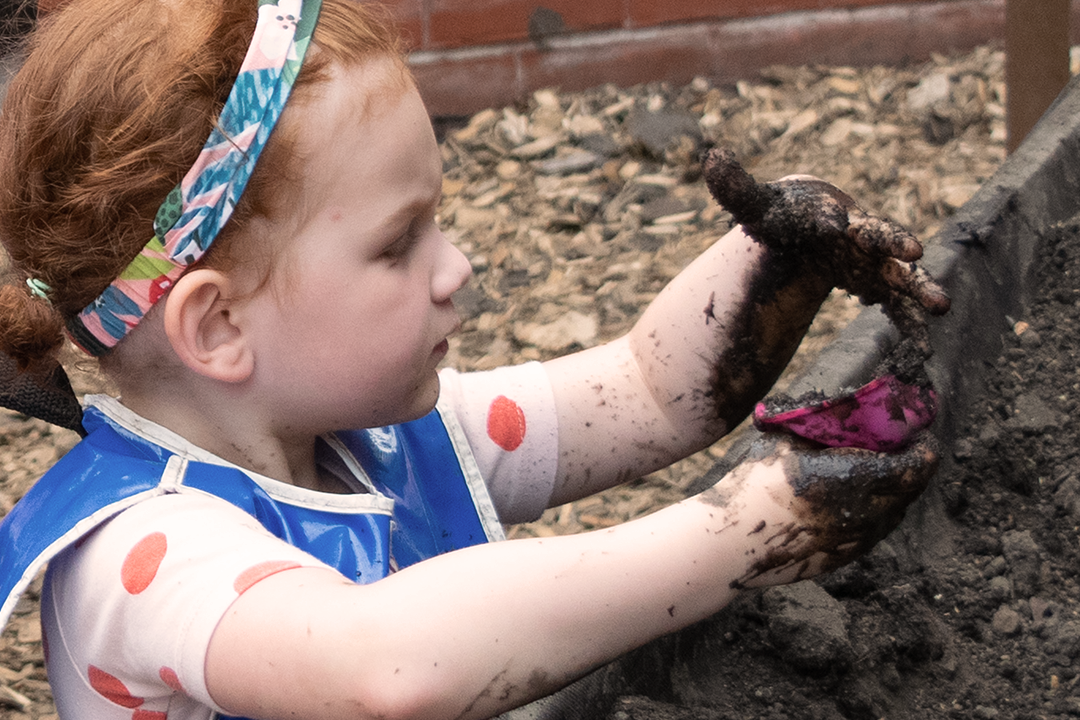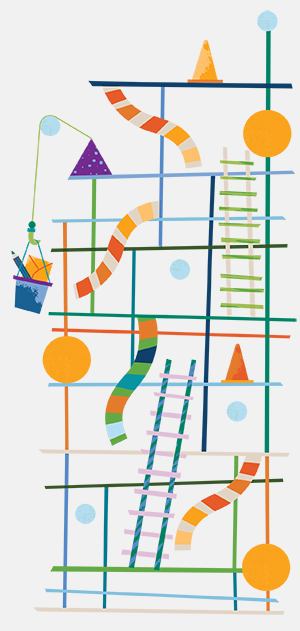
Playing with Mud: Why It’s Worth the Mess
Mud is messy. It’s sloppy and squishy and dirty. But it’s also a great tool for discovery and growth through play. From supporting cognitive development to boosting creative thinking and self-confidence, it turns out that mud is filled with benefits most of us don’t realize.
Jeanne Vergeront is a museum planner with a background in early childhood development. She’s also a mud enthusiast and has consulted with the museum on many projects. When it comes to mud play, she’s an expert.
“Mud is a messy and joyous medium full of great possibilities,” says Vergeront. “Playing with mud is a quintessential experience of childhood. It’s a world-making medium that lends itself to a full body experience.”
Here are the top four reasons Vergeront encourages all children to play with mud.
1. It’s a sensory-rich experience
Mud engages the senses by allowing kids to explore different textures, smells and sounds all at once. Feeling the sensation of cool mud on your hands, listening to it squish through your fingers and inhaling the earthy smell elevates the experience of playing with dirt and water. By engaging their senses in this way, children further develop sensory processing abilities, which are critical for processing information from the world around them. Plus, playing with mud just feels good!
2. It’s local and accessible
Mud is an equalizer when it comes to play. It doesn’t matter where you live, what language you speak or what your income is. You don’t have to order it from a store or mix any fancy ingredients to create it. It’s prevalent and readily available. Whether it’s a small mixing bowl and kitchen spoon or a giant mud pit, mud creates the same open-ended opportunities for everyone. It’s joyously accessible for all.
3. It’s unscripted and open-ended
Mud is full of possibilities, which makes it one of the best mediums for play. Playing with mud encourages creativity and imagination due to its endless potential. Kids can use mud to explore and experiment without any set expectations or rules on what they can or can’t do. They can make mud pies, build a castle, create a sculpture, paint it on their body, test how it moves through the air … or just have fun making a mess! This type of open-ended play is crucial for developing problem-solving, social-emotional and language skills.
4. It gives children control of their playtime
Many adults struggle with letting go and giving kids the freedom to experiment and play how they want. But mud is different. Most adults shy away from getting dirty, giving kids a unique opportunity to lead themselves. With mud, kids are the boss. There’s generally not a parent correcting them or directing them to do something a certain way. Research shows that giving kids the opportunity to direct their own play is integral to building skills like resilience and self-confidence.
“I know that mud can be scary and uncomfortable for adults. But the benefits of playing with mud far outweigh the discomfort of getting dirty,” says Vergeront. “Parents need to think back on their memories of playing with mud as a child and the joyful feelings they had as they likely got dirtier than their parents wanted at the time. Remember those experiences and delight in the idea that you’re giving your child those memories, too. Then, roll up your sleeves and squeeze some mud.”
Read more from Vergeront on why mud is such a great play tool in her blog, “Playing with… Mud.”

SUPPORTING A CHILD’S PLAY
SUPPORTING A CHILD’S PLAY
Playful Mindset Turns Chore Time into Play TIme
There’s no way around it: There are always chores to do and errands to run.
Those responsibilities don’t have to be a drag on an otherwise lovely day. What if, instead, they became a way to engage with kids and have some playful time together?
Tips for Tackling the Boredom Blahs
Kids are hard-wired to play. But even for children, the free and imaginative play that research shows is best for their development doesn’t always come easily. Sometimes their energy levels are low, daily frustrations are too high or they just can’t seem to find the inspiration to create their own fun. That’s when the dreaded “I’m bored” comes out.
Three Tips to Get the Most Out of Screen Time for Kids
Study after study shows that engaging with technology alongside your child helps them get the most out of it.
Helping Kids Manage Stress
While we can’t keep kids from feeling stressed, we can play a crucial role in helping kids feel safe and secure during stressful times.